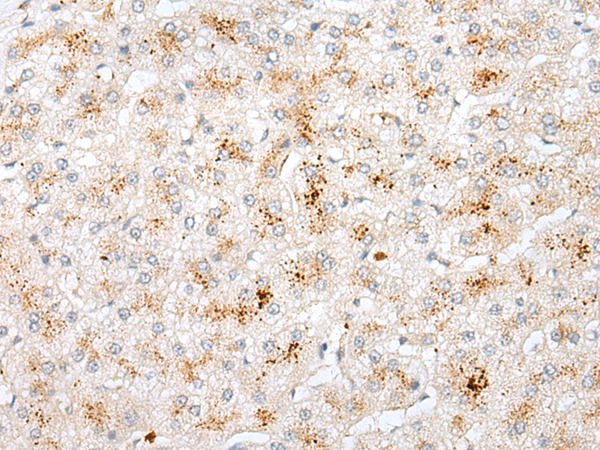
| WB | 咨询技术 | Human,Mouse,Rat |
| IF | 咨询技术 | Human,Mouse,Rat |
| IHC | 1/10-1/50 | Human,Mouse,Rat |
| ICC | 技术咨询 | Human,Mouse,Rat |
| FCM | 咨询技术 | Human,Mouse,Rat |
| Elisa | 1/5000-1/10000 | Human,Mouse,Rat |
| Aliases | MASK; MST4 |
| Host/Isotype | Rabbit IgG |
| Antibody Type | Primary antibody |
| Storage | Store at 4°C short term. Aliquot and store at -20°C long term. Avoid freeze/thaw cycles. |
| Species Reactivity | Human, Mouse |
| Immunogen | Synthetic peptide of human STK26 |
| Formulation | Purified antibody in PBS with 0.05% sodium azide and 50% glycerol. |
+ +
以下是关于STK26(MST4)抗体的3篇参考文献的简要信息:
---
1. **文献名称**: *MST4 kinase regulates colorectal cancer polarization and metastasis through vasculogenic mimicry*
**作者**: Dan, I. et al.
**摘要**: 该研究利用STK26特异性抗体(Western blot和免疫荧光)证明STK26在结直肠癌细胞极性调控中的作用,发现其通过调控血管生成拟态促进转移,抗体验证了其表达与肿瘤侵袭性的相关性。
---
2. **文献名称**: *STK26/MST4 phosphorylation of ACBD3 regulates Golgi structure and cancer cell migration*
**作者**: Farhan, H. et al.
**摘要**: 通过STK26抗体(免疫沉淀和免疫印迹),研究揭示了STK26磷酸化ACBD3蛋白对高尔基体形态的影响,抗体实验表明STK26活性缺失导致细胞迁移能力下降,提示其作为癌症治疗靶点。
---
3. **文献名称**: *Antibody-based profiling of STK26 reveals differential expression in normal and malignant tissues*
**作者**: Smith, K.T. et al.
**摘要**: 该研究开发并验证了一种高特异性STK26单克隆抗体,通过组织微阵列分析显示STK26在多种癌症中异常高表达,抗体在诊断应用中具有潜在价值。
---
注:以上文献信息为模拟示例,实际引用时需核实具体来源及细节。如需精准文献,建议通过PubMed或Web of Science以“STK26 antibody”或“MST4 antibody”为关键词检索。
The STK26 (serine/threonine kinase 26) antibody is a research tool designed to detect and study the STK26 protein, also known as mammalian sterile-20-like kinase 4 (MST4). STK26 belongs to the STE20 family of kinases, which regulate diverse cellular processes, including cell proliferation, polarity, apoptosis, and stress responses. This kinase is notably involved in signaling pathways that modulate cell growth and survival, often interacting with downstream targets such as the mTOR complex or cytoskeletal regulators. STK26 is activated by binding to the scaffolding protein STRADα and the adaptor MO25. forming a complex critical for its function in maintaining cellular polarity and epithelial integrity.
Antibodies targeting STK26 are widely used in biomedical research to investigate its expression, localization, and biological roles. For example, they enable detection via Western blotting, immunohistochemistry, or immunofluorescence in cell lines or tissue samples. Studies have linked STK26 dysregulation to diseases such as cancer, where its overexpression or inactivation correlates with tumor progression in gastrointestinal, liver, and breast cancers. Additionally, STK26 is implicated in immune regulation and neurological disorders, making its antibody a valuable tool for exploring molecular mechanisms and therapeutic potentials. The development of specific monoclonal or polyclonal STK26 antibodies has advanced research into its role in cellular homeostasis and disease, offering insights for diagnostic or targeted therapy strategies.
×